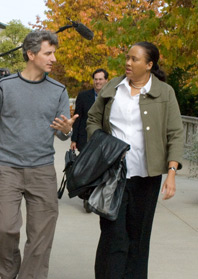Cheryl DorseyA different kind of healerNOVA: Do you see a common thread between why you went into medicine and what you are doing now? Cheryl Dorsey: I went into medicine because I wanted to help people and to be of service. Even though I don't practice medicine now, I think I still do those things. Many of my colleagues who work with patients heal one person at a time or one family at a time, and that's incredibly important work. I just felt that I needed to choose another path, and that maybe my highest purpose was working on a more systemic and community level. [Editor's note: The nonprofit foundation that Cheryl now leads, Echoing Green, provides grants to young entrepreneurs launching enterprises to bring about positive social change.] Q: When did you stop practicing medicine? Cheryl: After I completed my residency in pediatrics, I left the field of medicine pretty much forever. It's interesting, the journey you take in your life. I suppose it's no surprise that I ended up where I am today. I didn't have a great passion for medicine, although I loved my experience in medical school. I had a passion for being of service. Q: Do you regret going to med school? Cheryl: You know, in the work that I do now I interact with a lot of young people who are trying to figure out their paths in life. My story is an interesting one about some of the dos and don'ts. I tell people that they should follow their passion and have the courage to tell others, "I don't want to be a doctor or a lawyer. I'd rather be a documentary filmmaker or a kindergarten teacher." I don't regret going to medical school, but I knew early on that I never wanted to be a practicing physician. So I do wonder if there was another, easier route to get to where I am, happily, today. Q: Did you pursue the doctor path, in part, to please your parents? Cheryl: My mother was really excited about the possibility of her daughter being a doctor, and most certainly a Harvard-educated doctor. So I think the "good daughter syndrome" did play a role in all of this. But my parents were incredibly supportive. If I had said, "I actually don't want to be a doctor," they would have been fine with that. Eventually. [laughs] My mother might not have been too pleased initially after I broke the news to her, but there's no doubt in my mind that they would have supported me. Maybe I just felt it was easier to go along, partly because I didn't know about the wider options. I had a pretty traditional upbringing, and if somebody had told me about doing social change work or social entrepreneurship, I didn't know what that meant 20 years ago. Young people today seem much more savvy about their career choices. A sense of purposeQ: What kind of work did your parents do? Cheryl: I am the daughter of two public school teachers who devoted their lives to education in inner-city Boston. I think my dad may have been the first person in his family to go college. I think my mother was the second in her family. They both got advanced degrees. They believed you could accomplish anything in your life if you worked hard and got a good education. And I absolutely believe that's right. Q: Your parents saw you leave medicine. How did they react? Cheryl: Both of my parents had an incredible sense of humor. That was probably a good thing with all the twists and turns in my professional career. Every couple of years I would come up with something new, and they just sort of grinned and bore it. I think they were really pleased when I landed at Echoing Green, because they knew I had found my place in the world. They were really proud of the work that I've been doing here. "Perhaps it's no surprise that what I do today is very much about the context of families and the struggles they face." Q: I know that you lost both your parents since we last filmed with you. Can you talk a little about this? Cheryl: My father had been quite ill for a number of years. My mother did a phenomenal job taking care of him, and he died at home. I actually found him when I was spending the night at their house. He had been sick for a long time, and it's tough to watch someone you love deteriorate. Then my mother died quite suddenly, seven months later, of pancreatic cancer. It was just horrific. Nothing prepares you for it. You mark your life before those major life events and after them. It's extraordinarily difficult, but I think it gives me true empathy for the tragedy that befalls all of us at some point in our lives. I was also very fortunate to have family and friends and colleagues to help me through it. Q: Did losing them make you think more about your own mortality? Cheryl: I don't actually think so, because having been in the medical field, I was confronted with death and serious illness every day. But losing them did make me think more about the way I hope to live my life, and the legacy I'd like to leave behind. Distant memoriesQ: We have footage of you as a med student going to your first anatomy class, handling a cadaver. Do you remember that experience? Cheryl: No. I actually don't recall much of medical school, partly because it was 20 years ago and partly because I do such a different thing with my life now. Q: What does stay in your memory from that time? Cheryl: The memories relate to interactions with patients and families, the human dynamic piece, the struggles that families encountered that led them to the emergency room—their lack of health insurance or living in an inadequate housing situation. It was the human drama that really resonated with me. So perhaps it's no surprise that what I do today is very much about the context of families and the struggles they face. Q: In the later years of med school, working in the hospitals, did you feel mistreated by the older doctors? Cheryl: No. People hear horror stories about maltreatment of medical students on the wards by attending physicians and residents. But I never felt that once. My memories were, for the most part, incredibly positive. I have fairly vivid memories of my surgical rotation at the [Beth Israel Deaconess] Hospital. I watched female residents working long days with grueling 4 a.m. wake-up calls. These women loved what they did, and I remember thinking, These women are awesome. I even considered doing a surgical specialty because I admired them so much and thought they were terrific doctors. The Family VanQ: When you look back at the scene that shows you making the decision to pursue work with your mobile health clinic, The Family Van, how does it make you feel? Cheryl: It's hard to believe that The Family Van was started almost 17 years ago. We hit the streets on Martin Luther King Day in January 1992. It's amazing that this community-based health project is still in operation today, serving close to 7,000 clients each year. I'm really proud of that. Q: Where did the idea for the Family Van come from? Cheryl: Well, Harvard Medical School and the various teaching hospitals sit in inner-city Boston, near neighborhoods that face significant challenges. In the early 1990s, The Boston Globe did a five-part series that I will never forget. It really did change my life. It was called "Birth in the Death Zones," and it looked at the infant mortality rate in inner-city Boston. I remember reading it, thinking, "How, in the shadow of the world's best medical facilities, could black babies be dying at three times the rate of white babies?" It seemed so inequitable and so horrific. I became obsessed with the issue. It just seemed that these youngest citizens, who didn't have a fair start on life, deserved better. Working with Dr. Nancy Oriol, Dean of Students at the Medical School, we began to think about how we could make a difference. Could we change things? That's really how The Family Van got started. [Editor's Note: Echoing Green helped fund The Family Van.] Q: Is the concept of a mobile health van unique to Boston? Cheryl: No. There are a number of mobile health unit programs throughout the country that do the vital work of linking residents into existing health services. They serve as stepping-stones, providing access to care in very marginalized communities. When we researched the idea, we found that the residents of Boston had a lot of resources at their disposal. They simply did not have access to them. We realized that a mobile health unit could serve as a bridge to existing services. "Perhaps other people can learn something from my story, from my journey." Q: In practice, how did—and does—The Family Van work? Cheryl: In inner-city Boston, you've got people who come from all parts of the world. Many people don't have facility in English. So, for example, one day a week we would have a Haitian Creole-speaking public nurse. This nurse was available to make a woman who wasn't familiar with the city services negotiate the paperwork and the complexity of the medical system. This would help get her into prenatal care and understand its importance. Also, the name of this project was not The Mother's Van. It was called The Family Van for a reason. It's not just for pregnant women. It's for older men in the community who have hypertension and who are not being treated. It's for young people coping with issues of violence in their schools. We often had outreach workers to talk about conflict-resolution strategies for young people. So it was a very holistic approach to providing health care. Q: What's happened to infant mortality rates since The Family Van started? Cheryl: The differential between black babies and white babies has decreased in the years since The Family Van was started. We absolutely cannot take full credit for that decrease. There was a whole series of factors that led to the shrinking of the gap. But there are still various significant concerns in communities of color. Rates of diabetes have skyrocketed—it's almost become an epidemic in some communities. You now have issues like childhood obesity. So the challenges remain. The big pictureQ: As someone who has studied health-care policy and worked in community health, what's your broad diagnosis of our health-care system? Cheryl: I have not stayed immersed in health-care policy, but as someone who has a bit more knowledge than the average person, I think the health-care system in this country is in really bad shape. When I started medical school, there were about 37 million uninsured Americans. I think we're up to about 46 million uninsured Americans now. That's a devastating problem. And the percentage of the GDP consumed by health-care costs is just not sustainable. So, like most Americans, I think this is a crisis that we've got to do something about. Q: You spent a short time in the corporate world, working for a health-care communications firm. What was that like for you? Cheryl: At that point in my life, I had done my residency, I had gone back to graduate school, I had worked in the Clinton administration for two years, so I had seen a variety of different sectors. I appreciated my experience in the corporate world, but it wasn't a good fit for me—the focus on the bottom line. And I wasn't passionate about it. I only stayed there for a year, and then I quickly made my way back to Echoing Green. Q: Do you think that all your varied experiences—as a resident in pediatrics, your foray in the corporate world, trying out an academic path—have contributed to the work you do today? Cheryl: Definitely. I sort of believe that the universe unfolds in a particular way for a particular reason. Perhaps I had to have some of those experiences to really appreciate and fight for the work that I wanted to do.
Perhaps other people can learn something from my story, from
my journey. Just follow your bliss. Have the courage to
withstand familial pressure, societal pressure, and just do
what you love, because if you follow your passion and you do
what you deeply care about, you will excel and succeed. I've
gotten to that point, but I took a very circuitous journey to
get there. So if I can save a few folks from taking such a
long route, I'm happy to do it. |
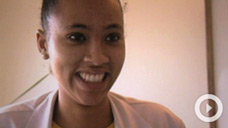

Watch Cheryl Dorsey's journey from med school to midlife in scenes from "Doctors' Diaries." (Running time 9:22) 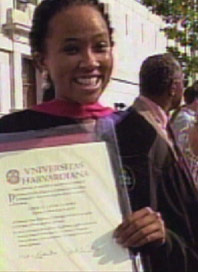
Ten years ago, Cheryl Dorsey put away her stethoscope forever, but she has no regrets about leaving medicine. 
While Cheryl says she enjoyed her training in pediatrics, she never felt the calling to be a physician. 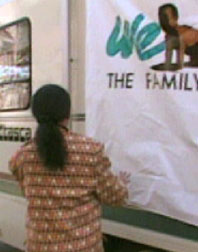
Shocking infant mortality rates in the community around Harvard Medical School inspired her to help start The Family Van, a mobile health clinic. 
In 2000, after experiencing life in government as a White House Fellow, Cheryl took a short foray in the corporate world at a health communications firm. 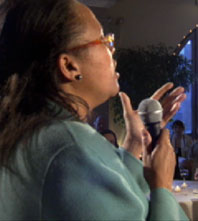
As President of Echoing Green, a role she took on in 2002, Cheryl now works tirelessly for an organization she feels passionate about. |
|
|
|
|
Interview conducted in July 2008 by Michael Barnes, producer of "Doctors' Diaries," and edited by Susan K. Lewis, senior editor of NOVA Online Doctors' Diaries Home | Send Feedback | Image Credits | Support NOVA |
© | Created February 2009 |
|
|
|







